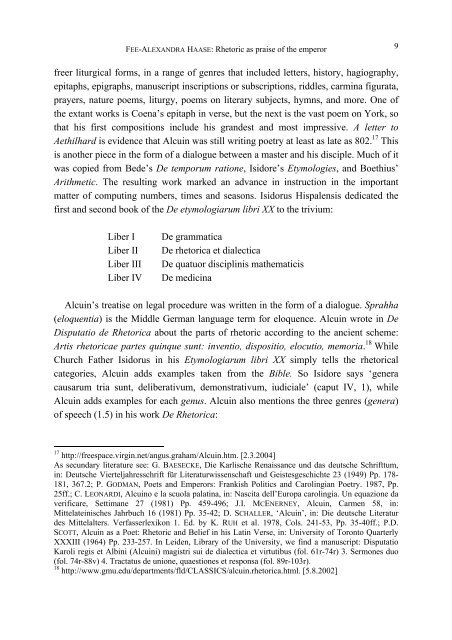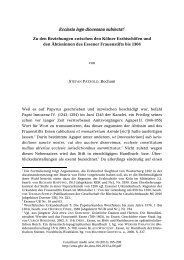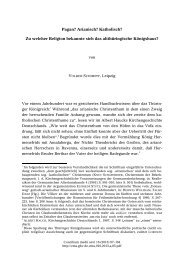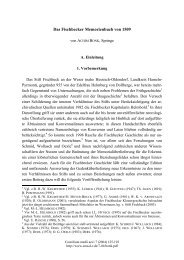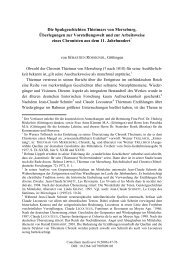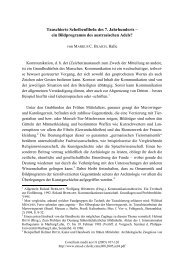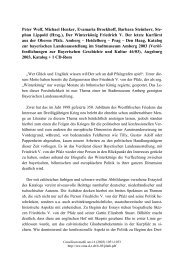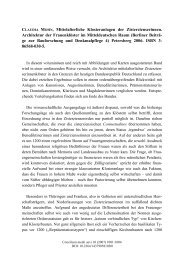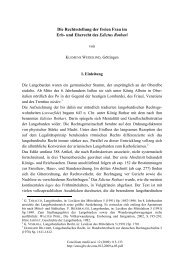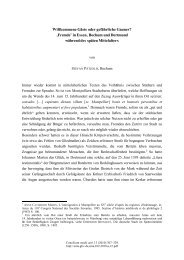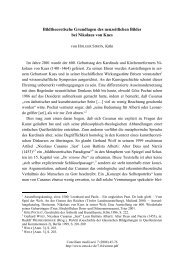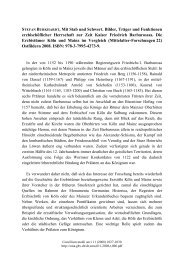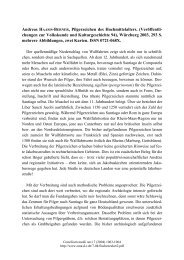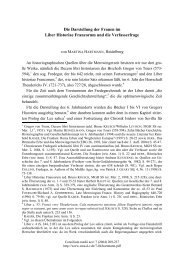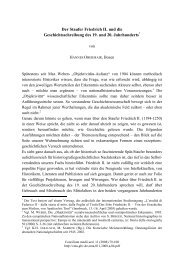Rabanus Maurus - Concilium medii aevi
Rabanus Maurus - Concilium medii aevi
Rabanus Maurus - Concilium medii aevi
You also want an ePaper? Increase the reach of your titles
YUMPU automatically turns print PDFs into web optimized ePapers that Google loves.
FEE-ALEXANDRA HAASE: Rhetoric as praise of the emperor<br />
freer liturgical forms, in a range of genres that included letters, history, hagiography,<br />
epitaphs, epigraphs, manuscript inscriptions or subscriptions, riddles, carmina figurata,<br />
prayers, nature poems, liturgy, poems on literary subjects, hymns, and more. One of<br />
the extant works is Coena’s epitaph in verse, but the next is the vast poem on York, so<br />
that his first compositions include his grandest and most impressive. A letter to<br />
Aethilhard is evidence that Alcuin was still writing poetry at least as late as 802. 17 This<br />
is another piece in the form of a dialogue between a master and his disciple. Much of it<br />
was copied from Bede’s De temporum ratione, Isidore’s Etymologies, and Boethius’<br />
Arithmetic. The resulting work marked an advance in instruction in the important<br />
matter of computing numbers, times and seasons. Isidorus Hispalensis dedicated the<br />
first and second book of the De etymologiarum libri XX to the trivium:<br />
Liber I De grammatica<br />
Liber II De rhetorica et dialectica<br />
Liber III De quatuor disciplinis mathematicis<br />
Liber IV De medicina<br />
Alcuin’s treatise on legal procedure was written in the form of a dialogue. Sprahha<br />
(eloquentia) is the Middle German language term for eloquence. Alcuin wrote in De<br />
Disputatio de Rhetorica about the parts of rhetoric according to the ancient scheme:<br />
Artis rhetoricae partes quinque sunt: inventio, dispositio, elocutio, memoria. 18 While<br />
Church Father Isidorus in his Etymologiarum libri XX simply tells the rhetorical<br />
categories, Alcuin adds examples taken from the Bible. So Isidore says ‘genera<br />
causarum tria sunt, deliberativum, demonstrativum, iudiciale’ (caput IV, 1), while<br />
Alcuin adds examples for each genus. Alcuin also mentions the three genres (genera)<br />
of speech (1.5) in his work De Rhetorica:<br />
17 http://freespace.virgin.net/angus.graham/Alcuin.htm. [2.3.2004]<br />
As secundary literature see: G. BAESECKE, Die Karlische Renaissance und das deutsche Schrifttum,<br />
in: Deutsche Vierteljahresschrift für Literaturwissenschaft und Geistesgeschichte 23 (1949) Pp. 178-<br />
181, 367.2; P. GODMAN, Poets and Emperors: Frankish Politics and Carolingian Poetry. 1987, Pp.<br />
25ff.; C. LEONARDI, Alcuino e la scuola palatina, in: Nascita dell’Europa carolingia. Un equazione da<br />
verificare, Settimane 27 (1981) Pp. 459-496; J.I. MCENERNEY, Alcuin, Carmen 58, in:<br />
Mittelateinisches Jahrbuch 16 (1981) Pp. 35-42; D. SCHALLER, ‘Alcuin’, in: Die deutsche Literatur<br />
des Mittelalters. Verfasserlexikon 1. Ed. by K. RUH et al. 1978, Cols. 241-53, Pp. 35-40ff.; P.D.<br />
SCOTT, Alcuin as a Poet: Rhetoric and Belief in his Latin Verse, in: University of Toronto Quarterly<br />
XXXIII (1964) Pp. 233-257. In Leiden, Library of the University, we find a manuscript: Disputatio<br />
Karoli regis et Albini (Alcuini) magistri sui de dialectica et virtutibus (fol. 61r-74r) 3. Sermones duo<br />
(fol. 74r-88v) 4. Tractatus de unione, quaestiones et responsa (fol. 89r-103r).<br />
18 http://www.gmu.edu/departments/fld/CLASSICS/alcuin.rhetorica.html. [5.8.2002]<br />
9


